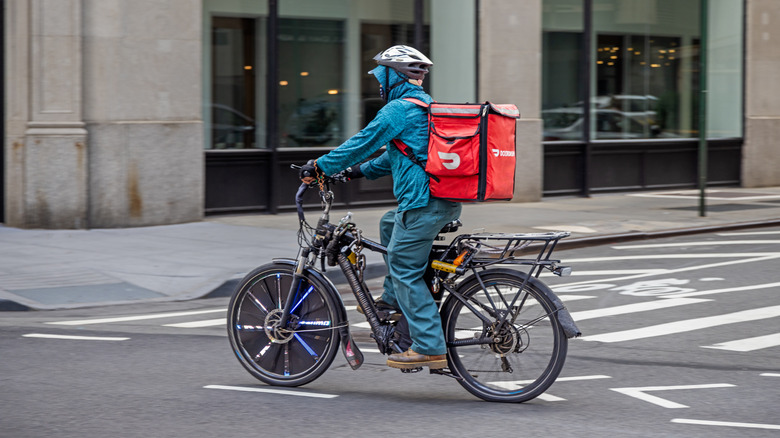NYC Food Delivery Workers Could Soon Make $18 Per Hour
The U.S. hasn't raised the federal minimum wage since 2009, and in many grocery stores in 2023, that $7.25 isn't even enough to buy a gallon of milk. Now, state governments are taking matters into their own hands and protecting their workers.
On Thursday, Manhattan Supreme Court Judge Nicholas Moyne ruled that Uber, Grubhub, and DoorDash legally cannot overturn or ignore the city's upcoming minimum wage mandate for third-party food delivery drivers. The new mandatory raise will ensure that NYC's estimated 65,000 delivery drivers earn at least $17.96 per hour before tips, a sizable jump from the $11 hourly average most workers were pulling, per the city's estimation. The nearly $18 wage will take effect in October 2023, and has the potential to further increase to $19.96 by 2025 with adjustments for inflation.
New York City's Department of Consumer and Worker Protection originally proposed the raise back in November 2022, asking for a $23.82 hourly minimum wage for "deliveristas." The compromised $17.96 was scheduled to take effect in July, but heavy adversity from the big three food delivery apps delayed the ruling until now. Grubhub, DoorDash, and Uber all challenged the raise, requesting temporary restraining orders. Only one smaller food delivery platform, Relay, has been granted an injunction. Now, Grubhub warns of higher order prices for foodies, but workers aren't rallying to make takeout more expensive for consumers — they're rallying to get paid a livable wage.
Fighting for workers' rights under big companies
It's yet unclear exactly how this wage increase will affect consumers. A Doordash spokesperson told CBS New York that the new ruling "will reduce opportunity and increase costs for all New Yorkers." Uber spokesperson Josh Gold says the increased wage will pit drivers against each other and make the competition even more fierce, via The New York Times, but Judge Moyne is holding companies accountable, arguing that this argument is fallacious. "Higher compensation, including for on-call time, need not be mutually exclusive with worker flexibility, and it is not irrational to pursue both goals simultaneously," he wrote, per the outlet.
NYC drivers (a large percentage of whom are immigrant workers) have reportedly been making poverty wages while DoorDash is currently worth an estimated $31.26 billion. Grubhub reportedly saw revenue of $2.4 billion in 2022 alone, and Uber Eats' revenue is said to have hit $10.9 billion that year. Sergio Ajche, co-founder of delivery worker union group Los Deliveristas Unidos, counts Moyne's ruling as a huge victory. "For me, it's important that the most powerful of the companies lost here," says Ajche, translated from Spanish via The City. "We demonstrated that change can happen, even if they don't want it to."
Earlier this week, on the opposite side of the country, California Governor Gavin Newsom signed a radical new wage law requiring the state's more than 500,000 fast food workers to be given a minimum wage of at least $20 per hour, taking effect on April 1, 2024.

